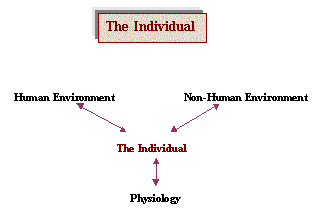|
“I believe in the supreme worth of the individual and in the right to life, liberty and pursuit of happiness. Every right implies a responsibility, every opportunity, an obligation and every possession, a duty.”The recognition of the value, rights and uniqueness of the individual are a fundamental part of healthy mental functioning and modern society. The Individual impacts and is impacted by his/her internal and external environment to maintain balance (homeostasis). As members of many different groups, there is a constant process to maintain a dynamic balance between our individual needs and the needs of the group(s) to which we belong. Our identity is how we perceive ourselves. Observing ego is an imagery function, which allows us to draw an image of how we appear to others. Self-esteem and self-worth are perceptions of our value as individuals. Self-doubt occurs when we question our adaptive capabilities, which may, then, motivate us to learn and expand these capabilities, but excessive self-doubt may impede adaptation. Self-esteem is very dependent upon our ability to recognize the validity of our emotions and to respond to them appropriately. Empathy is dependent upon our ability to recognize and validate the emotions of others. Effective social functioning is also dependent upon our capacity to recognize and appropriately respond to the emotions of others and ourselves. There needs to be an adaptive balance between our simultaneous attentiveness to the emotions of others as well as to ourselves. Personality is unique to each individual and is molded by the interactions of many systems. We all possess a hierarchy of adaptive (or coping) mechanisms. These coping mechanisms are, in part, instinctual but are also impacted by development, learning, and environment. A large, diverse repertoire of coping mechanisms, well integrated with our emotions, gives us insight and facilitates our ability to appropriately adapt to many situations. Coping mechanisms help us to make predictions of time and space in various systems, thereby facilitating adaptation. In many respects, our non-human environment is easier to predict but interpersonal predictions, particularly trust assessment, is the most challenging. Since we are highly social by nature, we lead our lives with complex interdependencies on others. As a result we are constantly attempting to predict whom we can trust, under what circumstances and to what extent. Is someone a nurturing or parental figure? Perhaps they are an ally, a competitor, a predator or some combination of all of these under different circumstances? Emotional judgment is critical in the development of this ability. Ability in this area and confidence in this ability is critical in our social functioning and self-esteem, fostering our motivation and our human spirit. If our capacity in this area is impaired, we may behave in a manner that would hamper rather than facilitate adaptation. This occurs when we implement counter-adaptive mechanisms that create a self-fulfilling prophecy causing a pathological vicious cycle in our interpersonal relationships. Thorough assessment and treatment helps in this area. A healthy society is dependent upon preserving the integrity of the individual and constantly perfecting our individual judgment. In an unhealthy societal state, there is a loss of the integrity of the individual. We become spectators and fantasizers instead of active participants. In our current society, there are many groups, individuals and organizations, which threaten the integrity of our individuality. In the presence of these pressures to conform, we must adapt by developing our unique potential at the same time. In so doing, this healthy development will improve our individual capacity for emotional maturation, judgment and development of our personal beliefs. This, in turn, strengthens the societal group structures to which we belong. Other attributes of the individual, the mind, the spirit and the soul are frequently discussed in many disciplines such as the humanities, ethics and religion. The mind is not synonymous with the brain. Clearly, the brain is needed for the mind to function. The brain is an anatomical component of the body while the mind is a functional component of the individual. The functioning of the mind extends beyond the physical boundaries of the brain, experiencing life and finding meaning in that experience. What is the meaning of the universe? Or the meaning of a flower? The mind experiences the rapture associated with being alive. The human spirit is linked with motivation, striving to fulfill the emotional needs of existence. Spirit can be suppressed as well as spontaneously restored. The Preamble of the U.S. Constitution points to the spirit behind our right to life, liberty and the pursuit of happiness. Throughout existence, mankind has embraced the spiritual elements of rituals in fulfilling our emotional existence. Marriage, for example, is viewed not only as a social arrangement but a spiritual exercise of the reunion of the self to the self or two becoming one. The soul is generally regarded as unique as it is the core of a person's individuality. The body, the mind and sometimes the spirit can be enslaved and controlled by another but the soul, unique to each individual, is considered to always be free. An area of intense debate is centered on when an individual's life begins and ends. Is the beginning of life abrupt or is it a gradual transition? At what point does life begin? Likewise, is the end of life a gradual transition? If the soul is infused in our individuality at the beginning of life, what happens to it at death? |
